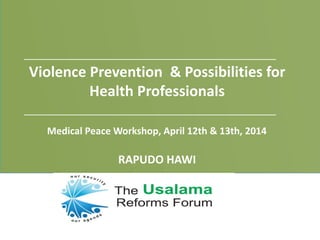Hawi Medical Peace Work Presentation 2014
- 1. Violence Prevention & Possibilities for Health Professionals RAPUDO HAWI Medical Peace Workshop, April 12th & 13th, 2014
- 2. Crime and Violence are Separate Concepts Crime is an act that violates a law. Violence is the intentional use of physical force, threatened or actual, that can lead to injury, death, psychological harm, or deprivation. Both undermine citizen security, the fundamental right to live and develop in a safe environment. Violence prevention is ŌĆó Springboard for Knowledge Sharing ŌĆó Policy evidence for Legislative + Institutional change ŌĆó Viable mechanism for Citizen Involvement & Participation
- 3. Crime and Violence are Separate Concepts Crime is an act that violates a law. Violence is the intentional use of physical force, threatened or actual, that can lead to injury, death, psychological harm, or deprivation. Both undermine citizen security, the fundamental right to live and develop in a safe environment. Violence prevention is ŌĆó Springboard for Knowledge Sharing ŌĆó Policy evidence for Legislative + Institutional change ŌĆó Viable mechanism for Citizen Involvement & Participation
- 4. Re-engineering Our Thinking OLD The State v. the Offender Offender breaking the criminal code Solution: 1. Punishment and Deterrence 2. Change offendersŌĆÖ disposition to commit crime Victim Offender Situation Solution: Intervene in the situation/ risk factors that produces Violence NEW
- 5. Theory of Change Changes from Violence Prevention a) Increase feelings of safety (for residents); and, b) Decrease incidents of Violence and Crime Community identified 3 conditions to achieve these changes: + + = Safe and welcoming physical environment Actively engaged residents Actively engaged and responsive partners FEELINGS OF SAFETY INCIDENTS OF violence
- 6. Risk factors accumulate in Community/Institutions 6 SOCIETAL COMMUNITY SCHOOLS/HOSPITAL/ PEERS FAMILY INDIVIDUAL Ecological Risk Model (Source: WHO, 2002) Examples of Risk Factors: ŌĆó Societal level: culture of violence, high levels of inequality; organized crime ŌĆó Community level: gun and drug availability, low social cohesion and trust, urban decay ŌĆó Schools/Hospital/Peers level: peers who are gang members, school violence, health related ŌĆó Family level: harsh parenting style; domestic violence and abuse; drug abuse ŌĆó Individual-level: biological (gender, age); low self esteem; inability to regulate emotions
- 7. Multi-Sectoral Approach Promote integrated and multi-sectoral approaches in violence prevention Targeting Risk + vulnerable groups Social prevention Situational prevention- Space related Strengthening criminal justice institutions Police Judiciary Prisons Linking local to national Violence Observatory National Government Policies County Government Plans
- 8. 1. Community Safety Forum as launch-pad for partners /At-risk groups 2. Crime Data, Patterns and trends from Kisii Police Station + Chief Office + Ram Hospital + Children Office into Observatory 3. Community Safety Audit + Plan Consultations with Core team-FBO, Chamber of Commerce, YWCA, Hospital, County government, Planning Department & Police Station 4. Training and Capacity Building: World Bank Institute and Kenya School of Government-Crime and Violence Prevention, CJPC Safety Audit & Crime Observatory Navigating Prevention In Community
- 9. Safety Data for Violence Prevention ŌĆó 73 % high prevalence of Drug and substance abuse. Youth at Car wash were likely offenders arrested on suspicion of handling stolen goods every month. ŌĆó Poor utilization and Management of Public Space. 10,000 Motorbikes operating in Town valued at Kshs 800 million, but risk ┬Į of revenue to injuries, insecurity or accidents ŌĆó 65% strong association between Sexual Based Violence and Alcohol abuse. 200 entertainments spots employ about 1,000 bar attendants exposed to sexual assault, rape, support teen prostitution, drug/Alcohol abuse, 84 % existence of vigilantes, 52% pay for protective services Kisii Police Station crime report: Petty crimes were 5917 of 6678 (2008), 5816 of 6475 (2009) , 4209 of 4891 (2010) and 1139 of (2011)
- 11. Mobilizing Communities into Violence Prevention Community Safety Strategies 1. Community priorities-Public Spaces; Youth Violence, Drugs and substance abuse; Restoring formal Justice 2. Community Forum- 50% (At risk groups) + 30% (Community) + 20% partners/Govt actors 3. Community Action Plans ŌĆó Local Safety Initiative ŌĆó Collect data on crime and violence ŌĆó Monitor policing service delivery + Accountability ŌĆó Document Community voices
- 12. Journey + Stories + Photos
- 13. 0 Example of Car Wash Risk As Champion of Prevention Facts and Data Group Daily Income for 15 members = 15 members X Kshs 600 X 30 days= Kshs 270,000 10 Carwash income in Kisii ŌĆō Kshs 2.7 Million Loss ┬Į of savings to drugs , Alcohol, injuries and police arrests = 1 million Work with them 1) Regulations restricts use of alcohol and drugs at the station 2) Campaign on alcohol and drugs as hindrance to investment and youth innovation 3) Partnership + Matchup scheme for those give up alcohol and drug 4) Customer Satisfaction feedback (desk)
- 14. Possibilities for Health Professional Functions Partnership Assessment and Research ŌĆó Hospital Observatory that has data + facts on Community, Intimate Partner, Domestic violence ŌĆó Educational Research on Violence prevention ŌĆó Documentation and Reporting of Best Practices (HIV/AIDS, Collaborations and Participation ŌĆó Model for Doctor ŌĆō Patient Conflict Violence ŌĆó Community consultations /projects for (youth (rehabilitation + other risk groups) that offer alternative-to-violence ŌĆó Communication systems that help share information on plans and policies regarding violence prevention- (Web platform for pregnant mothers ) ŌĆó Space utilization and Management within Health facilities that cause injuries, accidents and death Preparedness and Planning ŌĆó Emergency response campaign for area prone to disaster victims ŌĆó Skills programs on first aid, mediation and conflict transformation Laws and Regulations ŌĆó Policy advocacy on laws regarding forensic evidence, ŌĆó Review Health professionalŌĆÖs within county framework regarding violence prevention
- 15. Thank You & For enquiries Tel: 0720975498 Email: rapudo.hawi@usalamaforum.org www.usalamaforum.org















